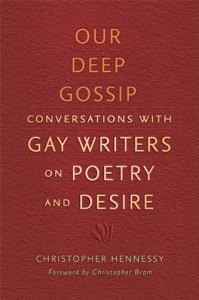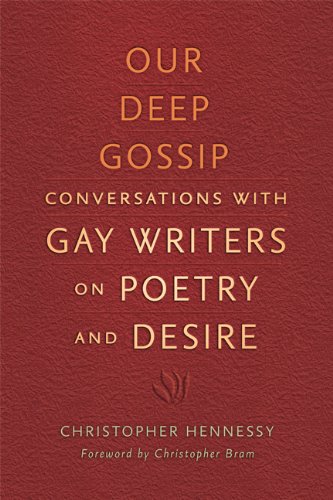 Our Deep Gossip: Conversations
Our Deep Gossip: Conversations
with Gay Writers on Poetry and Desire
by Christopher Hennessy
University of Wisconsin Press. 288 pages, $26.95
“I’VE NEVER UNDERSTOOD why more people don’t love poetry.” These are the very first words in Christopher Hennessy’s collection of interviews with gay male writers, Our Deep Gossip, and they belong to novelist Christopher Bram, who provided the book’s foreword. Bram’s conundrum is not an issue that Hennessy or any of the eight writers he interviews explores at length here. Bram himself does so only briefly, asserting that the very nature of good poetry—as “short, succinct, highly quotable, and very portable”—should ensure its popularity.
Bram’s point is certainly well intentioned, but his suggestion that poetry is widely accessible seems like an attempt to sell it to skeptical customers. Granted, much good poetry does have the qualities Bram mentions, but any poem worth reading is inhabited by complexities and shades of meaning that can only be appreciated through repeated readings over time. What’s more, the best poetry takes up residence within us, presenting and reforming itself in our consciousness if we remain open and quiet enough for it to do so. In short, it takes work. And there’s the catch, and an answer for Bram’s lament; we live in a culture that seems to discourage the literal and figurative quietude necessary for something as meditative as the reading of poetry.
Hennessy’s interviews are ostensibly concerned with gay male poetry, and each in its own way touches upon the themes of sexuality, the body, and the experience of otherness. But this book is really a series of love letters to the grand project of poetry with a capital P. It certainly helps that the book includes some of America’s finest poets, but what gives it even more power is that Hennessy has done his homework. He has clearly studied each poet with reverence and care, and he has a gift for fresh insight and challenging questions. In more than a few cases, he surprises his subjects with his knowledge of their work and his ability to prompt them to think about it in new ways.
The first challenge for a book like this is whom to include. In his introduction, the editor admits that he focuses on gay male writers simply because that’s his field of interest. It’s not to imply that a similar project with lesbian, bisexual, trans, or even straight writers wouldn’t be worthwhile. In the end Hennessy interviewed the following eight poets: Edward Field, John Ashbery, Richard Howard, Aaron Shurin, Dennis Cooper, Cyrus Cassells, Wayne Koestenbaum, and Kazim Ali (arranged from oldest to youngest). It’s an admirably diverse group, and Hennessy provides not only a bibliography for the eight poets but also an extensive list of recommended reading that covers some poets who could not be included, as well as a memorial nod to gay poets no longer with us.
One of the delights of this book is the way in which these men have become a supportive and even loving community of writers. In reading their words about each other, one begins to think of them as a kind of brotherhood. There is, of course, the admiration of the younger writers for those who came before them. In the other direction, the older poets share touching moments of appreciation for the younger ones, who in some cases are former students.
Perhaps the book’s greatest pleasure is the “drunk-on-ideas” (Bram’s phrase) quality of these discussions about the poets’ work, about the craft of poetry, and about gay culture more broadly. In addition to some venerable poets such as Ashbery and Howard, included are some poets who have explored out-of-the-way territories—Dennis Cooper, for example, who’s best known for his novels but who was an important and pioneering figure in gay poetry in the 1970s and ’80s, and was not afraid of intensely sexual subject matter.
There are plenty of downright fun and intriguing revelations as well, such as Ashbery’s revelation that he adores the popular PBS series Antiques Roadshow—and that he’s used phrases from the show’s participants in his poetry. Then there’s Wayne Koestenbaum, singing the praises of former porn star turned masseur Max Grand. Koestenbaum’s interview, by the way, is one of the liveliest and most entertaining in the collection. He’s a writer who’s clearly in love with language and the craft of writing, and there are times when he seems to be on the verge of composing poetry in the middle of the interview.
There’s a sense of presence and immediacy in all of these conversations, even though some of them were conducted via Skype or through e-mail exchanges. In this book, as well as in an earlier work, Hennessy has done a great service not only to gay poetry but to poetry in general. Ours is a nation that needs to be reminded of the treasures it has in its poets.
Jim Nawrocki, a writer based in San Francisco, is a frequent contributor to this magazine.






